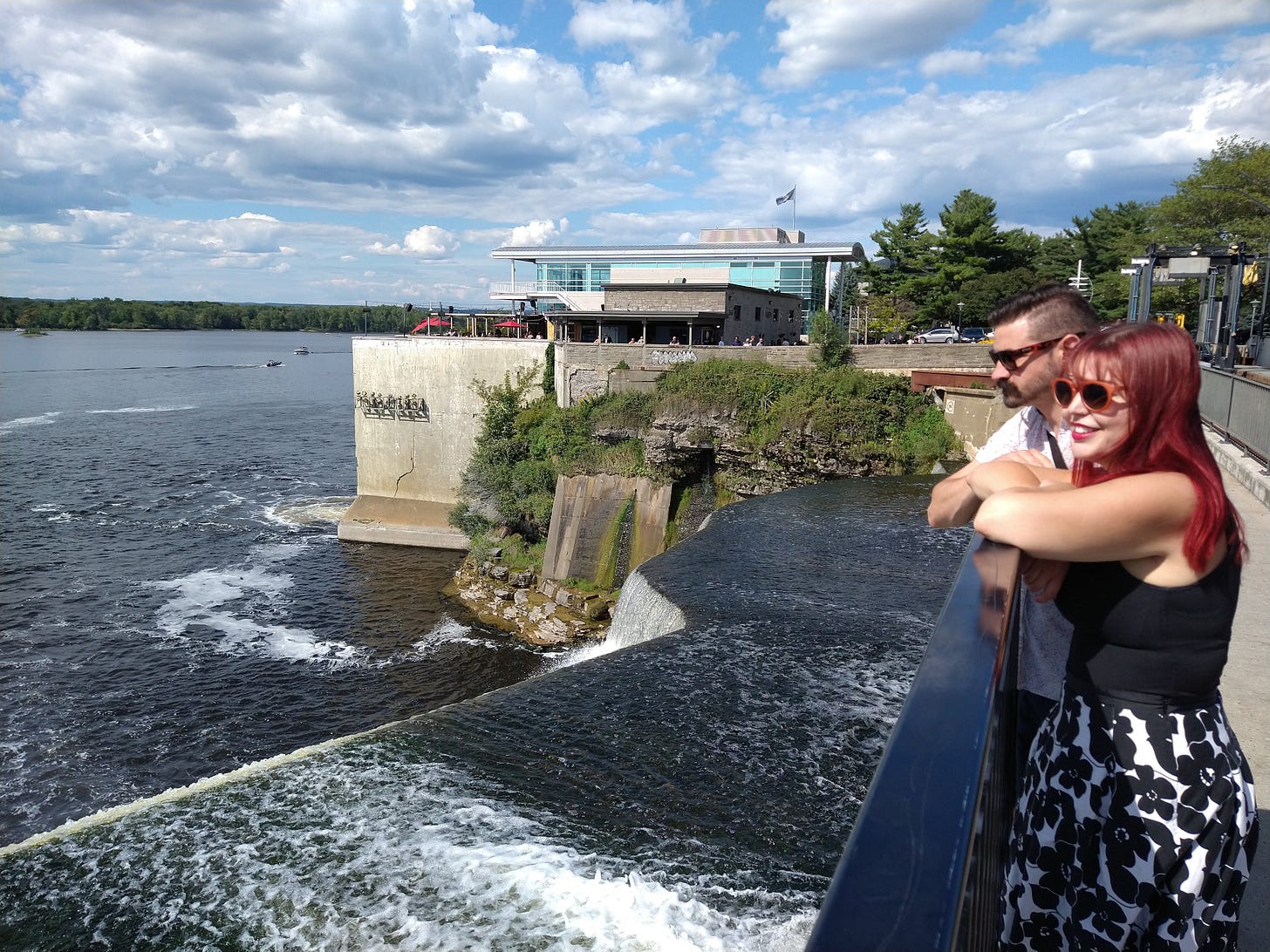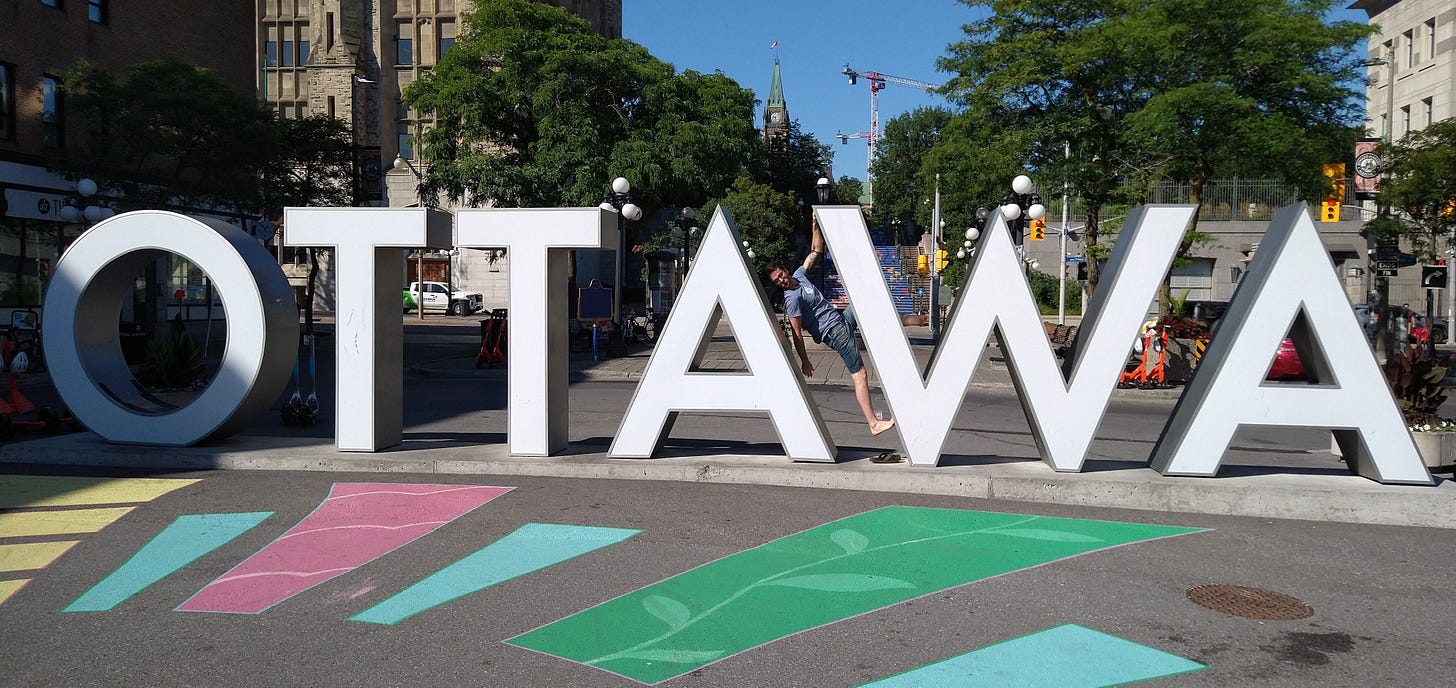The little touchscreen I’d installed in my Honda displayed the route on Google Maps as I drove west. There, on the long, straight road ahead, I saw the label for the first time: “Trans-Canada Highway.”
I felt as if I was driving deep into the Canadian heartland—though, as I was later reminded, the U.S. border remained about 100 km away the whole drive.
When you go north from New Hampshire, you kind of expect more mountains. Bigger mountains. A vast wilderness, perhaps, wild and untamed. But what actually happens, once you get past Franconia and the Whites and cross the border into Canada, is that everything turns dead flat.
There is a great, massive plain north of the border and south of the St. Lawrence River. Sailing in from the Atlantic, first you come to Quebec City, that quaint tourist magnet, with the well-preserved old town, about as charmingly old-world French as the New World can get. Then, you arrive in Montréal, the crown jewel of French Canada, the big city, brimming with nightlife and culture, museums and giant parks, and university students at every turn.
The St. Lawrence keeps travelling to the southwest, forming part of the border with upstate New York, until dumps into the lake and you get to Toronto—but if you instead branch up and slightly over, you pass from Quebec into Ontario, until you reach Ottawa.
That’s where I was headed.
Why people visit Ottawa
At long last, I was going to visit my close friend and kitesurfing buddy, Etienne.
The last I’d seen him was pre-pandemic, but now, with borders reopened, our travel schedules had finally overlapped, and he was only a five and a half hour drive from my house in New Hampshire. A few days before the trip, he asked me what I wanted to do while I was there—just see your pretty face, I said. No agenda.
After all, it’s not like I had any idea what people do in Ottawa. Before a bunch of questionably-inspired truckers parked their semis downtown and refused to move for several weeks last winter, most Americans had likely never thought twice about Ottawa.
But Etienne assured me: tourists do come. He’s seen them.
- What kind of tourists? I asked.
- Mostly Asian ones. On tour buses.
- Where do the buses take them?
- To the market mostly.
As it turns out, the market, Byward Market, was just a few blocks from Etienne’s apartment. Shortly after I arrived, Etienne and I walked from his place in Lower Town over to the buzzy area where the tourists get dropped off (I didn’t see any) to get dinner and a beer.
We sat at The Brig Pub, just across from the big, colorful Ottawa sign (“You know Ottawa has made it, because we got a sign, just like Toronto,” said one of Etienne’s friends later).
Over house brews we caught up on the last few years. We’d been to the DR together, to the Outer Banks, and to Mexico, all to kitesurf. This would be the first time I’d see Etienne in his native environment: Ottawa.
Lake Meech
The next morning, we threw some beers—there are a lot of beers on this trip—water and towels into our backpacks and drove to Lake Meech, where Etienne, his dog Otis, and I walked a rolling, forested path to the water, past the main, crowded beach, past the completely uninhabited nude beach (or, nude “meeting spot”), until we semi-bushwhacked our way to a peaceful, rocky outcropping.
We swam, we dried off on the rocks, and we drank the beers. Etienne sent friendly waves to the SUPers as they glided by, they waved back, and I remembered just how polite and nice everyone is here.
I asked Etienne what he thought defined Ottawa. Why would a tourist decide to visit here, in addition to, or even instead of, say, Montréal or Vancouver?
We’re really polite, he said.
City of Politeness, I offered as a tourist slogan. But we both frowned, squinted a little, and shook our heads. Nah.
I pointed over to a gigantic mansion perched on a cliff overlooking the lake. Etienne said it was the site of the Meech Lake Accord, a famous meeting having something to do with the Canadian constitution, greater autonomy for Quebec, freedom, rights, all that good stuff that politicians like to talk about.
Hmm. Ottawa: the Capital of Canada. Seat of Government. Center of Power.
Etienne and I speculated about whether there might be any international tourists who could properly fit the label of “Canadian political junkie,” and concluded that a total audience of three or four people worldwide was probably not enough on which to hinge a pricey tourism campaign.
Ottawa, Center of Power was out.
Spikeball
Still: later that day, we found ourselves drinking yet more beer on a picnic blanket in Major’s Hill Park, with a view of the impressive Parliament of Canada building just behind us.
We weren’t there to get a tour of the Canadian halls of power, though—we were there to meet his friends for Spikeball.
What is Spikeball, you may ask?
Answer: only the most pure fun I’ve had on a lawn in years.
Spikeball really is quite deficient as a spectator sport—but as a way to spend a pleasant afternoon in the park with beer and friends, it might be unsurpassed. Played on a net suspended about six inches off the ground, Spikeball is kind of a combination of volleyball and racquetball, but with equipment that can be carried around in a small backpack and played almost anywhere you’ve got an open, flat, grassy space. I learned how to play in about two minutes, and then Etienne and his friends and I proceeded to spend the next 4-5 hours setting, passing, and spiking this tiny ball into the net.
Does it sound (and look) completely dorky? Yes. Will you be converted into a believer if you give it a try? Most certainly.
PSA for the Ottawa tourism board
That night, we electric scootered to Bank Street, where we got shwarma before joining more friends for a pub crawl, which, as responsible male adults, we’d agreed would last no longer than one change of venue.
At the first bar, we met some more friends, and got introduced to a few strangers, one of whom happened to work for the Ottawa tourism board. Again: I wondered exactly what kind of messaging might put this city on the map (and somehow neglected to ask her, who was actually in a position to know).
So far, I’d had a great time. Ottawa is super livable. There are walkable neighborhoods, places to eat, to shop, parks to visit, sights to see. Everyone is indeed friendly and polite. But what was the brand? Montréal has its nightlife, it’s Francophone culture. Vancouver has the great outdoors. And Toronto, Canada’s most populous city, has its cosmopolitan, international reputation. Even Alberta had a tourism campaign, which I’d seen in the U.S. trying to lure me into the super impressive and gorgeous Canadian rockies.
The next day, we sat on Etienne’s back porch discussing with one of his friends who works in communications. I put on my strategic marketing hat, and started mulling slogans in my head. I thought of the Asian tourists getting off the buses to go shopping, of the universal politeness, the chill nightlife, the Spikeball in the park, nearby the government institutions, all interwoven with lazy rivers, walking paths, and expansive parks.
I asked Etienne and his friend which part of the country they thought of when they heard the phrase, “The Local Heart of Canada.”
They both agreed: Ottawa.
The place to come live like a true Canadian. To see true Canada. Not Francophone Canada, not West Coast Vancouver, not international Toronto—but local Ottawa, the heart of the country.
We took Otis and walked over to Bordeleau Park, past the Department of External Affairs (the Canadian State Department), over the bridge to Green Island with the war memorials, to Rideau Falls.
Then we drank beer overlooking the Ottawa River. A band was playing cheesy 90s covers. All around us, Ottawans basked in the beautiful weather of a warm a Summer day.
- A lot of locals here, I said, raising an eyebrow. Here, in the Local Heart of Canada.
- Maybe the tourism board will buy that one from you, Etienne said.
The next morning, before heading back home on the Trans-Canadian, Etienne graciously snapped some pictures of me next to the Ottawa sign. I’d been living like a local for the past 48 hours, but I did at least feel like doing this one tourist thing:





